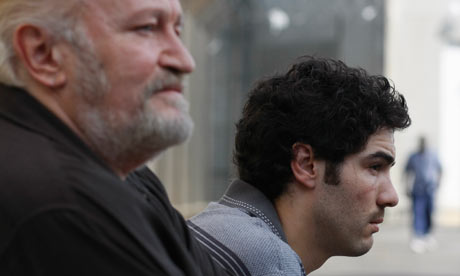
There is pure magic to a film by Audiard. Or perhaps I am just partial to directors who seem to thrive on the verging between worlds. Bahrani's Man Push Cart. Akin's The Edge of Heaven. I don't name-drop for authority but to offer a context, a culture of exemplary film-making around the intersection of worlds.
Jacques Audiard's films have always found worlds intersecting. Read My Lips brought a deaf woman in a cut-throat business firm in line with an ex-con still attuned to the criminal world. The Beat That My Heart Skipped, leagues above its point of inspiration, an American exercise in painful stereotyping called Fingers, brings a man between his mother's world, of music, and his father's world, of crime, to a state of diasporic crisis. Thrown into Audiard's take on the older story is a second bridging of worlds, between the protagonist and a woman who shares with him only the language of the piano.
The intersections in A Prophet are no less striking, moving, and grounding -- so much so that to relate the plot is nothing; betrays nothing of the film's depth. In it, Tahar Rahim plays Malik El Djebena, a young Arab man sent to a French prison, where over time he progresses from pawn to kingpin of its mafia. So what? A man goes to prison -- yes, we have seen this before. A man of one culture/sub-national identity goes to a prison dominated by another culture/sub-national identity -- yes, we have seen this before, too.
But have we seen the particulars of cultural difference melt away? Have we seen the universalism of certain human wants, and needs, and anxieties, and power plays rise up in their stead while we weren't looking? Have we seen the magic of the human mind, the strange personal world-building of the individual consciousness, make itself manifest so fluidly that we as viewers accept without question the validity of Malik's visions as much as we do the walls of his prison and the long arms of his cell-block tyrants?
Audiard understands our proclivity as viewers towards clean narrative, titles, frameworks: indeed, he anticipates them, weaving them into the atmosphere of each scene, each image, with a surety I can ascribe only to a handful of contemporary directors. But Audiard also knows that narrative is only the beginning; that any honest journey into the human condition is not linear or similarly well-defined. And so he leaves us avenues. He leads us to the depths of his characters, his contexts, and lets us decide what lessons to take from them -- what stories to build.
Earlier this year I described Hunger as one of the best films about prison I'd ever seen. Even now, I do not regret that description, for while A Prophet is far and away the best film I've seen this year to date, it's also not a film "about prison" or even "about a prisoner." Rather, Audiard's work transcends: This is a film about a man pared by circumstance to his deepest, most inward-looking self; about the lingering impressions that arise in our minds from the choices we make; and about the tendency towards life, and not just survival, that beats deeply enough in some of us to represent the very best, the most human, in us all.
No comments:
Post a Comment